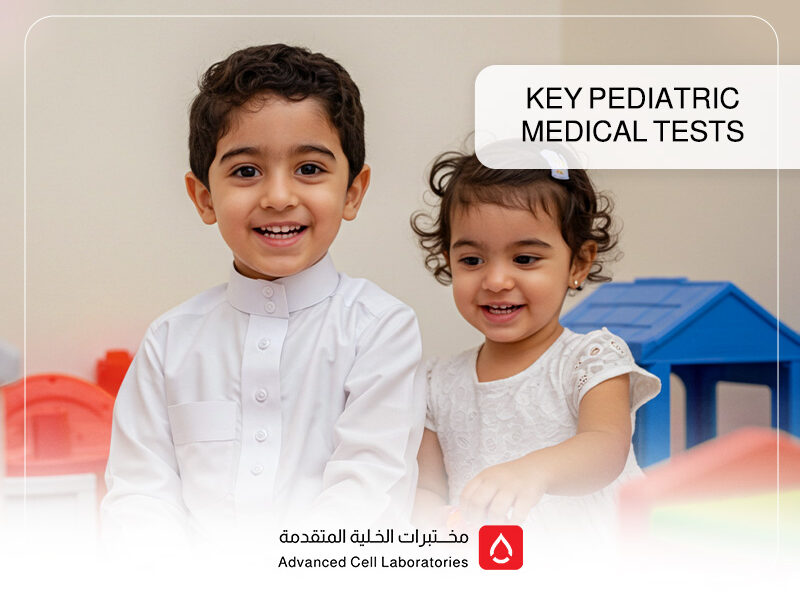
Children’s health is a top priority for every family. Conducting regular tests for children is an effective way to ensure proper growth and early detection of any health issues.
In this article from Advanced Cell Labs in Saudi Arabia, we highlight the most important tests your child may need at various stages of growth, helping you monitor their health accurately.
Why Do Children Need Regular Tests?

Regular tests help to:
- Detect chronic or hereditary diseases early
- Evaluate proper growth and development
- Check the function of organs such as liver, kidneys, and thyroid
- Identify vitamin and mineral deficiencies like iron, calcium, and Vitamin D
- Monitor any unexplained symptoms
When Should Children Start Testing?
It is recommended to begin tests from the newborn stage, especially newborn screenings. Tests should then continue periodically according to a child’s test schedule:
- Comprehensive tests for children at least once a year
- Routine tests when symptoms appear or there is a hereditary predisposition
Complete Blood Count (CBC) for Children
The CBC is one of the first and most important tests for children. It measures red blood cells, white blood cells, and platelets, helping detect:
- Anemia
- Infections
- Blood clotting disorders
Thyroid Test for Infants and Children
The thyroid regulates growth and energy. TSH and T4 tests are recommended, especially in early childhood, to detect:
- Hypothyroidism or hyperthyroidism
- Delayed physical or mental development
Blood Glucose Test
This test helps detect:
- Type 1 Diabetes
- Metabolic disorders
- Recommended for children with a family history of diabetes or symptoms like excessive thirst or weight loss
Iron and Hemoglobin Tests
Iron deficiency anemia is common in children. Tests include:
- Hemoglobin test
- Iron and anemia assessment to determine if supplements or dietary changes are needed
Urine and Stool Tests
These tests help to:
- Detect urinary or kidney infections
- Check for parasites or intestinal infections
- Monitor digestive system health
Vitamin D and Calcium Tests

Vitamin D is essential for calcium absorption and bone building. Recommended tests include:
- Vitamin D for children
- Calcium and magnesium levels to identify deficiencies affecting healthy growth
Food Allergy Tests
If your child experiences rashes, vomiting, or diarrhea after certain foods, tests should be done to:
- Identify food allergies and prevent future exposure
Common Immune System Tests
These tests include:
- Immune deficiency tests
- Antibody tests to assess the child’s immunity, especially if frequently infected
Pre-Vaccination Tests
Sometimes tests are recommended before vaccinations, including:
- Complete blood count
- Immunity checks against certain viruses to ensure a proper vaccine response
When Should Tests Be Done if Symptoms Appear?
Do not wait for illness to appear. Go for testing if your child shows:
- Unexplained weight loss
- Changes in skin color or overall activity
- Delayed growth or motor/mental development
- Frequent infections or fever
How Test Results Improve Your Child’s Health
Test results help you:
- Take early preventive actions
- Adjust diet or lifestyle
- Start appropriate treatment before conditions worsen
- Monitor ongoing growth and health
Frequently Asked Questions About Children’s Tests
1. Do blood tests hurt children?
They are usually quick, and labs use child-friendly tools to minimize pain.
2. How often should tests be done?
At least once a year or as recommended by the doctor.
3. Can children be tested at home?
Some labs, like Advanced Cell Labs, offer home sample collection.
4. Are there tests specifically for newborns?
Yes, including thyroid screening, metabolic genetic tests, and hearing tests.
Essential children’s tests are a key step toward a healthy future. Don’t wait for symptoms—schedule regular check-ups at Advanced Cell Labs, where we ensure accurate results and fast service with a specialized pediatric care team.
Book your child’s test now at Advanced Cell Labs or contact us to find out the appropriate testing schedule for their age.

